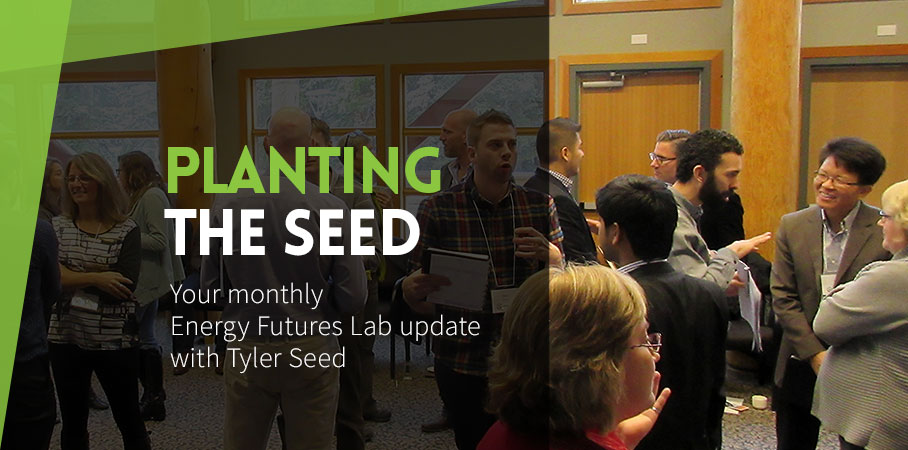
The first time I heard the term “Learning Journey” I had a little trouble taking it seriously. I mean, we’re talking about field trips, right?
Well, sort of. If they are field trips, then they’re field trips with a very specific and important function in the lab process.
What makes the trip even more timely is the fact that Fort McMurray is reeling from of the fall in oil prices, laying bare aspects of the community that represent seeds of resilience in the face of adversity.
Next month the Energy Futures Lab Fellows will travel together to Fort McMurray, the epicenter of oil sands development, a symbol of economic opportunity, and a lightning rod for criticism of the industry. But Fort Mac is a community, and no community is as one-dimensional as the common caricatures of Canada’s most famous, or infamous frontier town. The fellows will soon experience the reality firsthand.
Of course, each of the fellows is an expert on some aspect of Alberta’s energy system, and as such, this will not be the first trip for many of them. Whether they’ve been (or in some cases even lived there) or not, each fellow is guaranteed to experience dimensions of Fort McMurray that they haven’t before.
In smaller groups, they will see the footprint of the oil sands from the air, tour an oil sands mine and visit Ft McKay to engage with a variety of community members affected in different ways by oil sands development. Others will visit social service organizations including shelters, employment agencies, food bank, and engage in dialogue with Mayor Melissa Blake. Others will tour a local First Nations owned and operated company, engage with the Regional District, the local business community, and the region’s Social Prosperity road map.
______
Organizing a trip for 40 people to do so many different things is a logistical feat. It isn’t cheap and it isn’t easy, so it wouldn’t be happening if it weren’t important. So why are we doing this?
What is so important about taking the fellows to Fort McMurray or including learning journeys in the lab process at all?
To experience the real effects of transition in communities where it is already underway.
In Fort McMurray, the Fellows will gain a better understanding the real-life implications of energy transition in a community that is heavily dependent on oil and gas, and these lessons will apply across Alberta. What makes the trip even more timely is the fact that Fort McMurray is reeling from of the fall in oil prices, laying bare aspects of the community that represent seeds of resilience in the face of adversity.
The major shifts in energy systems that we all sense coming have real-life consequences in the lives of actual people living in these communities, and the Fellows will do well to understand these realities as they work to craft a new transition story for Alberta’s energy future.
To understand in what ways the current system does not match our desired future.
In many ways the Energy Futures Lab approach to learning journeys takes its cue from REOS Partners Social Labs. As pioneers in the field of system-shifting labs, REOS has been using learning journeys for years to “develop a shared, grounded understanding of the system they are trying to influence.”
What sets an EFL learning journey apart is that it follows on February’s backcasting workshop where the fellows began articulating a shared vision of their desired energy future for Alberta. This emphasis on understanding the current state of a system in relation to where we want to be in the future is key to developing the creative tension that drives innovation.
To build the relationships that move innovation forward.
EFL is about bringing leaders from across Alberta’s energy system together to build partnerships and launch initiatives that would never have happened otherwise. But you can’t just put a bunch people who have never met into a room and expect great things.
We all know from experience that relationships are key to the best collaborations. Learning journeys play an essential role in building relationships among the fellows by providing shared experiences and opportunities to get to know one another outside of the office. The fellows are finding common ground that may not have been there before.
______
Alberta’s energy system is incredibly complex, and the best way for the Fellows to understand its many dimensions as well as possible is to explore the reality on the ground. Visiting the system is intended to pull these experts out of their habitual thinking patterns and assumptions, leading to insights that couldn’t have happened otherwise.
If our goal is to shift a system, it is crucial that our understanding of that system is grounded in experience and the reality faced by people living it, not just theory.

Tyler Seed The Natural Step Canada’s Business Development Manager. He holds a Master’s degree in Strategic Leadership Towards Sustainability from Blekinge Tekniska Högskola in Sweden.



